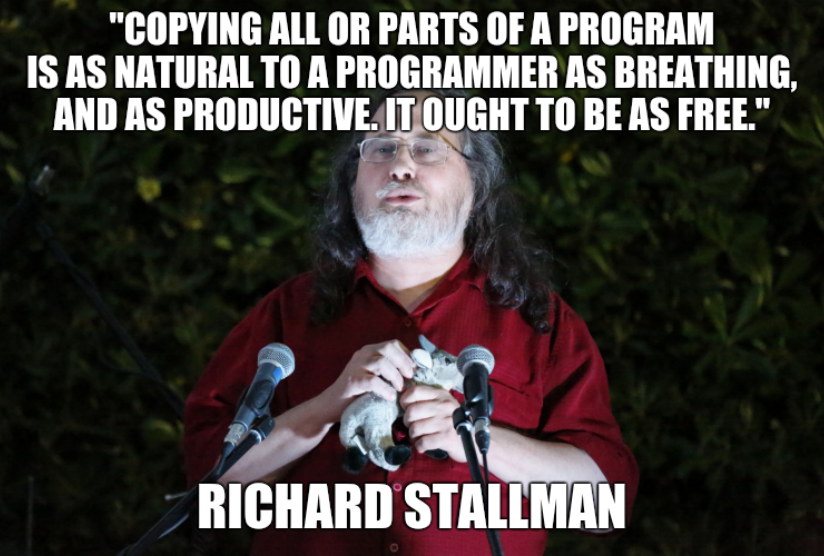

And I think they rewrote a bunch of C libraries in order to have a better cross-platform compiler for C and zig. Or something along those lines


And I think they rewrote a bunch of C libraries in order to have a better cross-platform compiler for C and zig. Or something along those lines


You can’t replace it.
Zig?
Terminal velocity is the maximum speed attainable by an object as it falls through a fluid (air is the most common example). It is reached when the sum of the drag force (Fd) and the buoyancy is equal to the downward force of gravity (FG) acting on the object. Since the net force on the object is zero, the object has zero acceleration
Objects in a vacuum have no drag and no terminal velocity…
How would it reach terminal velocity in a vacuum?


hmmmmmm


MilTek scrapped the internet to make OpenBlade
MATACORP saw the project and thought “What if we had AIs think instead of our customers?” and so web 4.0 was born


GPL is hard or tough to monetize
What do you mean?
stuff will get even spicier when we have conservations whether code is asset itself (especially scripts).
That’s true. What about LGPL?


OpenBlade reunites with his long lost family


e.g. don’t touch AGPL code unless you also use AGPL
Just to clear this up: copyleft licenses, GPL variants for example, require the license of your code to equally preserve the freedoms provided to your users, or in other words also be a copyleft license. There are some loopholes like GPL on a server, but be very careful when using copyleft code unless you want to use a copyleft license as well.
It gets somewhat murkier when you use someone’s code and base yours on that. IANAL, and that’s very much the legal territory. If at all possible, just reuse the original copyright and license and then derive your work (given the license allows that).
That all depends on the license AFAIK, but IANAL. Most FOSS licenses allow you to do whatever you want while preserving copyright claims, and that includes rewriting or changing the license. GPL forces copyleft, so even if you rewrote it from scratch, you could still be liable if you saw the original code.
For example I’ve heard that corpos bootleg copyleft code by having completely separate teams doing design and implementation. The implementation team can’t ever see any part of the original code, and they have limited communication with the design team. I think that would also go around the copyright claims as well.
If at all possible, just reuse the original copyright and license and then derive your work (given the license allows that).
Or just slap a GPL and subsume everything within a vortex of FREEDOM, and thusly become a true FOSS dude

there are very few “starter” Clojure jobs; they mostly expect you to have years of experience.
That’s because the language is made for people who wrote java for the last 10 years. It’s cool and all, but it’s horrible for learning programming when you compare it to cl or scheme. Neither of them break language uniformity and simplicity in order to accommodate java interop, while also having decades worth of excellent teaching material.
It’s a Lisp language which is the oldest kind.
Fortran, COBOL, ALGOL are older
Instead of “object oriented”, I think if it as verb oriented. Each statement is a verb (function) possibly followed by all the nouns you want to apply it to. Easy peasy, right?
I think you’re over complicating the explanation, it’s just a different notation:
(1 + 2 + 3) == (+ 1 2 3)
(1 + (2 * 3)) == (+ 1 (* 2 3))
People complain that there’s “too many parentheses”. People like to complain about dumb stuff.
I think it’s got more to do with everything seemingly being completely different. Most languages have C-style syntax, and python is like the only popular exception. It’s like knowing only latin and having to learn cyrilic or alphabet.
It’s not pretty, but it’s uniform, obvious, and easy to understand.
go is good grug friend who chase away complexity demon by limit damage of big brain developer


wasn’t multi-user made exactly for managing the packages/profiles between different users?
No, it’s allow you to have a set of packages for each user, and to give you improved security and isolation.
In this case nix download all of the packages to /nix/store, and then symlinks them to the appropriate ~/.nix-profile/


You need the single user installation
The better question is do you actually need to do that. Something like sudocmd() { sudo "$(which "$1")" "${@:2}"; } will automate sudoing user packages.
Julia, Clojure and Go. Are any of these good for a beginner or should I start with something else?
That totally depends on what you want to do.
Go should be easiest since it’s purposefully simplified in order to make learning it easier. There are some more difficult concepts, but the start should be easy enough. I know about go with tests, but it’s not really programming beginner friendly.
I’d avoid clojure as a beginner. It’s more for people who know java, but don’t want to write java. Common lisp and schemes are good for learning programming, but they’re not a popular group of languages and that can be a problem.
declarative > imperative all day, every day
I’m going to have to come back to Nix/NixOS in a bit.
Use nix + home-manager first for sure. It’s far easier, and you can slowly get into it while making a list of bleeding edge packages.
I’ll probably wait until the official docs catch up as it appears that they are quite a bit behind
Skip them altogether when you’re starting out. I gave up on trying nix the first few times due to how bad they are. zero-to-nix.com is better for learning the basics of nix.
That and I’m not sure how I feel about a DSL for package management. I’d much rather use JSON or YAML, or even INI or TOML.
The closest you can get is home-manager with a list of packages in a json-like format. It’s really not practical to develop a declarative system without a programming language. A basic example would be variables, more advanced would be to write a wrapper that modifies the package so it automatically runs the required cli commands to use your dediated gpu and nixGL with specific packages (nvidia-run-mx nixVulkanNvidia-525.147.05 obs for example).
It’s sort of like IaC where you’ve got terraform (dsl), pulumi (various languages), and cloudformation (json/yaml). Can you guess which one is universally despised?
Maybe if I were a LISP or Haskell guy.
Then you’d use guix and a dsl made within an actual programming language (much better approach IMO).


Reports in the New York Post newspaper said that viewers in the US had seen people in Dublin exposing body parts, making inappropriate gestures and holding up footage of 9/11 since the installation opened last week.
Based
Flip and burn!!!